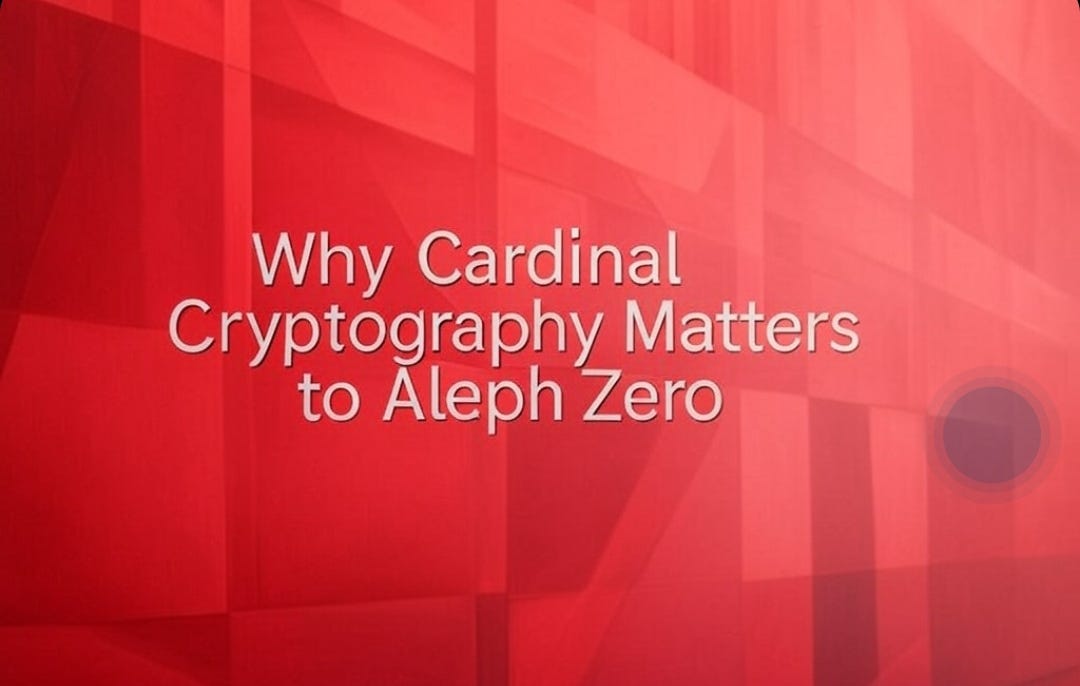Blockchain technology is evolving rapidly, but privacy, scalability, and security remain major challenges. Aleph Zero, a privacy-enhancing Layer 1 blockchain, is tackling these issues head-on with cutting-edge cryptographic techniques. At the heart of this innovation is Cardinal Cryptography, a research and development company that plays a critical role in shaping Aleph Zero’s technology.
This article explores why Cardinal Cryptography is essential to Aleph Zero, its contributions, and how it helps drive blockchain privacy, security, and scalability.
What Is Cardinal Cryptography?
Cardinal Cryptography is a research-driven company focused on cryptographic solutions, blockchain protocols, and security engineering. It leads the core development of Aleph Zero, ensuring that the blockchain remains fast, secure, and private while maintaining decentralization.
Founded by top cryptographers and blockchain researchers, Cardinal Cryptography provides scientific rigor and innovation to Aleph Zero’s architecture.
How Cardinal Cryptography Powers Aleph Zero
1. Developing the Aleph Zero Consensus Protocol
One of Cardinal Cryptography’s biggest contributions is the AlephBFT consensus protocol, a Byzantine Fault-Tolerant (BFT) algorithm that ensures:
✅ Fast finality – Transactions are confirmed in seconds.
✅ Scalability – High throughput for enterprise and DeFi use cases.
✅ Security – Resilient against attacks and network failures.
Unlike traditional blockchain models that rely on Proof-of-Work (PoW) or slow Proof-of-Stake (PoS) mechanisms, AlephBFT offers a leaderless, asynchronous consensus, ensuring maximum efficiency.
2. Advancing Privacy with zk-SNARKs and sMPC
Privacy is a core principle of Aleph Zero, and Cardinal Cryptography drives its privacy stack using:
🔐 zk-SNARKs (Zero-Knowledge Succinct Non-Interactive Arguments of Knowledge) – Allows verification of transactions without revealing sensitive data.
🔐 sMPC (Secure Multi-Party Computation) – Ensures that multiple parties can compute data together without exposing their inputs.
Together, these technologies enable confidential transactions, private smart contracts, and secure data sharing, making Aleph Zero one of the most privacy-focused blockchains in the space.
3. Enhancing Security and Cryptographic Resilience
Cardinal Cryptography ensures robust security through:
🛡️ Cryptographic audits and formal verification – Strengthening Aleph Zero’s smart contract framework.
🛡️ Advanced zero-knowledge proof research – Improving privacy-preserving protocols.
🛡️ Protection against quantum threats – Exploring post-quantum cryptographic solutions.
By continuously researching and implementing state-of-the-art cryptographic methods, Cardinal Cryptography ensures Aleph Zero remains secure against evolving threats.
4. Driving Web3 and Enterprise Adoption
Cardinal Cryptography’s innovations make Aleph Zero ideal for real-world applications, including:
🏦 Institutional DeFi – Private and scalable financial solutions for businesses.
📜 Regulatory-compliant privacy – Selective disclosure for legal compliance.
📈 Enterprise blockchain adoption – Secure, high-speed blockchain solutions for companies.
With privacy, scalability, and compliance-ready features, Aleph Zero is positioned as a Web3 leader, and Cardinal Cryptography ensures it stays ahead of the curve.
Why Cardinal Cryptography Matters
Without Cardinal Cryptography, Aleph Zero wouldn’t have its groundbreaking consensus model, privacy tech, or security-first approach.
✅ It pushes cryptographic boundaries to enhance blockchain privacy and security.
✅ It builds cutting-edge blockchain architecture for real-world adoption.
✅ It ensures scalability without compromising decentralization.
By driving research and development, Cardinal Cryptography is the backbone of Aleph Zero’s innovation.
Final Thoughts
Aleph Zero’s success in privacy, scalability, and security is not just about blockchain—it’s about cryptography. And Cardinal Cryptography is leading that charge.
As the world moves toward privacy-preserving blockchain solutions, Cardinal Cryptography’s research will shape the future of Web3.
Aleph Zero is more than just a blockchain—it’s a vision for a secure, private, and scalable digital future.
About Author
Joel Gubihama is a Web3 growth strategist, business development specialist, and blockchain advocate passionate about driving blockchain adoption in Africa. As the Founder of Humus Labs and Co-Founder of Trim and LudiPlay, he is actively building and scaling innovative Web3 solutions across DeFi, gaming, and sustainable finance. With expertise in zero-knowledge cryptography, decentralized finance, and blockchain marketing, Joel is dedicated to educating and empowering communities to leverage privacy-enhancing technologies like ZKPs for financial inclusion and digital security.
Socials




